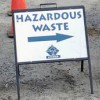
To apply, please send a cover letter detailing your interest in the position with your resume and a writing sample to: administration@cvswmd.org. For more information including a complete job description, please visit our employment page. Vermont's Universal Recycling law, Act 148, bans recyclables and organics from the landfill.
Services
About Us
Report
The Central Vermont Solid Waste Management District (CVSWMD) is leading our communities to reduce waste! As a union municipality with a Zero Waste Implementation Plan, we provide valuable waste management programs and services to our 19 member cities and towns to assist them in proper waste disposal and reduction efforts.
Our Mission
Report
Central Vermont Solid Waste Management District provides education, advocacy, and services for residents and businesses in reducing and managing their solid waste in order to protect public health and the environment. The CVSWMD is working to end waste for good. While achieving a zero waste district may seem ambitious, we believe that by setting goals high, we can and will find ways to reach them.
Our Staff
Report
Barb has been with the District since the turn of the century (this one) and loves chatting with residents about their solid waste and the CVSWMD's programming - no, really - so give her a call with questions or comments. She has a BA in writing, likes to cook, read and make music. Jeremy joined the District as compost monitor in 2017, but now works at the ARCC where he is a master at processing batteries for safe recycling.
Employment & RFPs
Report
CVSWMD is looking for qualified applicants for the positions below. To apply, please send a cover letter detailing your interest in the position with your resume and a writing sample to: administration@cvswmd.org. Our team at the Central Vermont Solid Waste Management District helps residents and businesses in our 19 member towns reduce, reuse, recycle, and rethink their waste for a more sustainable future.
Recycling
Report
Mandated Recyclables - Vermont's Universal Recycling Law (Act 148) bans recyclables from the landfill. Certain materials clog the machinery at the Materials Recovery Facility, where recyclables get sorted, baled and shipped to market. Some items, like food-soiled materials or liquids, can contaminate loads of recyclables and make them unsellable.
Reviews

Be the first to review Waste Management.
Write a Review